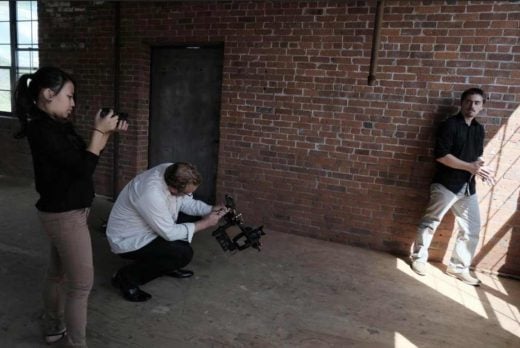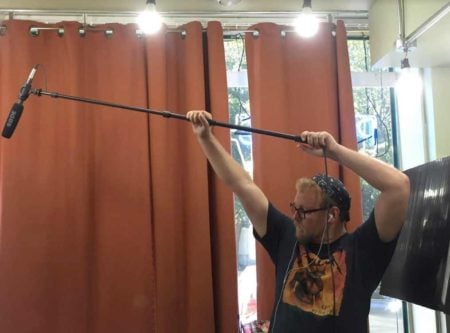
FC students Connie Specyalski and Clinton Mann prep
to shoot Michael Ferretti
student
Clinton Mann observes a foundational change that’s happened in his thinking since starting his apprenticeship.
“Something that has happened in the program,” he says,
“from the screenwriting level to the production level to studying the curriculum, is that there’s a lot of belief structures that have been broken down for me: that a good idea is not so great if all it is is an idea, to it being the purist mentality that’s really been holding me back.”
Starting his career as an actor, Clinton had spent several years in New York City working to establish himself before moving to Connecticut (“Living in New York wasn’t my scene,” he admits). Finding fewer acting gigs available in his area, Clinton decided to expand his horizons.
“I found myself looking into returning to school,” he says,
“but there are not a lot of film programs near me. It would have been a much larger commitment for me than I was willing to take to actually get into a film program at a university.”
Clinton started searching for alternatives online and discovered the Film Connection could train him on-the-job.
“I looked into it, and through talking and learning that there were indeed mentors in my area, I gave it a go,” he says.
“I’m glad I did.”
Clinton was placed as an apprentice with filmmaker Michael Miceli of
Miceli Productions near Hartford, CT—and this, he says, is where the practical nature of the program began to change his mindsets.
“Michael has a lot of gear, and he’s not afraid to put it in our hands,” says Clinton.
“I think that is hugely important because I didn’t know much about anything like the large Panasonic cameras that we use. I was afraid to even touch it for the first three times we went out with it. And finally we filmed a promo for a stage play that’s going on here, and I had to man one of them all by myself. So I finally got over it and I was like, ‘Wow! I did some really cool stuff with it.’ And [I] felt very confident…That’s where Michael really stands out is that he doesn’t just make you observe him using the camera or play an assistant role. He puts the camera right in your hand, you know…you’re the director of photography, and I think that’s really, really important.”
The curriculum, Clinton says, has also helped break down some wrong mindsets for him.
“It very much is a pragmatic [approach]… You’ve got to understand your genre, and you do that by reading scripts or watching movies. I had personally got into this belief system that the way to change the redundancy in the film industry is by rejecting it…that if I reject all of Hollywood, you know, or all of the film industry, I will have this immaculate idea. And I never got it. And now I feel more inspired because I’m studying film. I’m watching films, I’m reading scripts, screenplays and I’m boosting my creativity by doing that.”

Clinton on Boom
Clinton also feels that learning the production aspects of film gives him more perspective as an actor.
“Learning about hierarchy of a production was really helpful,” he says,
“because you know, as an actor you fit in to that hierarchy at some level. And having more data and being more confident about that hierarchy makes me a more viable commodity as an actor.”
As he finishes up his Film Connection apprenticeship, Clinton is expanding his horizons even further, embracing many more aspects of the film process than he did previously. As another example of moving from theory into practice, he says his screenwriting mentor Ron Peterson is helping him flesh out a screenplay that has been nothing but an idea in his head for years. His plan after graduation, he says, is to start his own production company, with a focus on a specific interest of his—documentary film.
“There’s something magical about the documentary,” he says.
“You know, you get real people talking, you get a lot of factual data that you can cut together and make entertaining…I think it’s a great way to present aspects of life to people. And I just really admire it as a communication tool.”
Any advice for other students now that he’s been in the program?
“Always communicate, always keep in contact with Student Services,” he says.
“If you feel like you’re not jiving with your mentor, you know, tell somebody….I rely on Student Services. Definitely don’t take the curriculum for granted.” Also, he says, spend as much time in the studio as possible.
“You have to watch out for life kind of getting in the way,” he says.
“If your schedule is only allowing you a few hours a week, you might not get the most out of it…So make sure that you’re getting a sufficient number of hours in with your production mentor for sure.”
* * * * *



